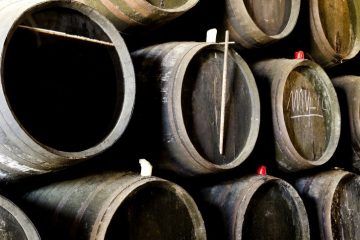Does the name vin doux naturel ring a bell? If you’re a fortified wine fan, you want to be all over this stuff. Vin doux naturel, or VDN for short, is the best fortified Muscat drink you’ve never heard of. If you like your dessert wine sweet, strong and fruity, this is your thing.
What is vin doux naturel?
The French phrase “vin doux naturel” literally translates to “naturally sweet wine”. VDNs, as they are often known, are produced mostly from Muscat, though sometimes from Grenache. The typical VDN is a strong Muscat drink with a lot of sugar, a lot of alcohol, and some pleasant, if a little simple, grape flavours.
The name is not entirely accurate, however, as the level of sweetness (and alcohol) does not occur naturally. Like Port, VDNs get their sweetness and high alcohol by the addition of a high-alcohol spirit during fermentation. The alcohol kills the yeast before it has had the chance to convert all the grape sugar into alcohol. The result is a wine with high residual sugar and high alcohol. In the best cases, this makes for a very tasty Muscat drink indeed.
VDN: Is it a “wine” or a “Muscat drink” (or what)?
VDN is officially considered to be a wine, and not just merely a “Muscat drink” or similar term. The best French VDNs tend to come from two distinct winegrowing regions: Languedoc-Roussillon and the Rhône Valley. Within each, there are numerous individual appellations dedicated to VDN production, and most bare the word “Muscat” in their name, leading many casual drinkers to think of VDN as its own category, a type of Muscat drink, rather than as a wine.
Where does VDN come from?
You’ll find Muscat-based VDN produced in various parts of France, generally in and around Languedoc-Roussillon and the southern Rhône Valley.
Roussillon
The largest appellation and production area is Muscat de Rivesaltes, in Roussillon. Muscat de Rivesaltes accounts for some 70% of France’s total Muscat production. Most Muscat de Rivesaltes is released very early, often in the spring following the harvest, and is intended to be enjoyed right away.
Another local VDN, simply known as Rivesaltes, is permitted to use Muscat grapes, though many other grapes are also permitted and, often, favoured.
Two other appellations, Banyuls and Maury, produce excellent red VDNs, with Grenache being the major grape variety.
Languedoc
In Languedoc, VDN is associated with four appellations in particular:
- Muscat de Frontignan
- Muscat de Lunel
- Muscat de Mireval
- Muscat de St-Jean-de-Minervois
Of these, Muscat de Frontignan is the most historically significant, known to produce the finest fortified sweet Muscat drink of all. Classic Muscat de Frontignan is gold, luscious and sweet. Its flavour profile is not all that complicated, but very generous and pleasant: Think a lot of grape flavours and aromas, sugar and alcohol. It’s not exactly an everyday drink, but it can certainly give a lot of pleasure.
Rhône Valley
In the Rhône Valley, the best fortified Muscat drink comes from Muscat de Beaumes-de-Venise. The other well-known VDN appellation in the area is Rasteau, where Grenache is the primary grape. Rasteau is a rich, heady red fortified wine.
Have you ever tried any vin doux naturel?
[cta_generico id=2645]


